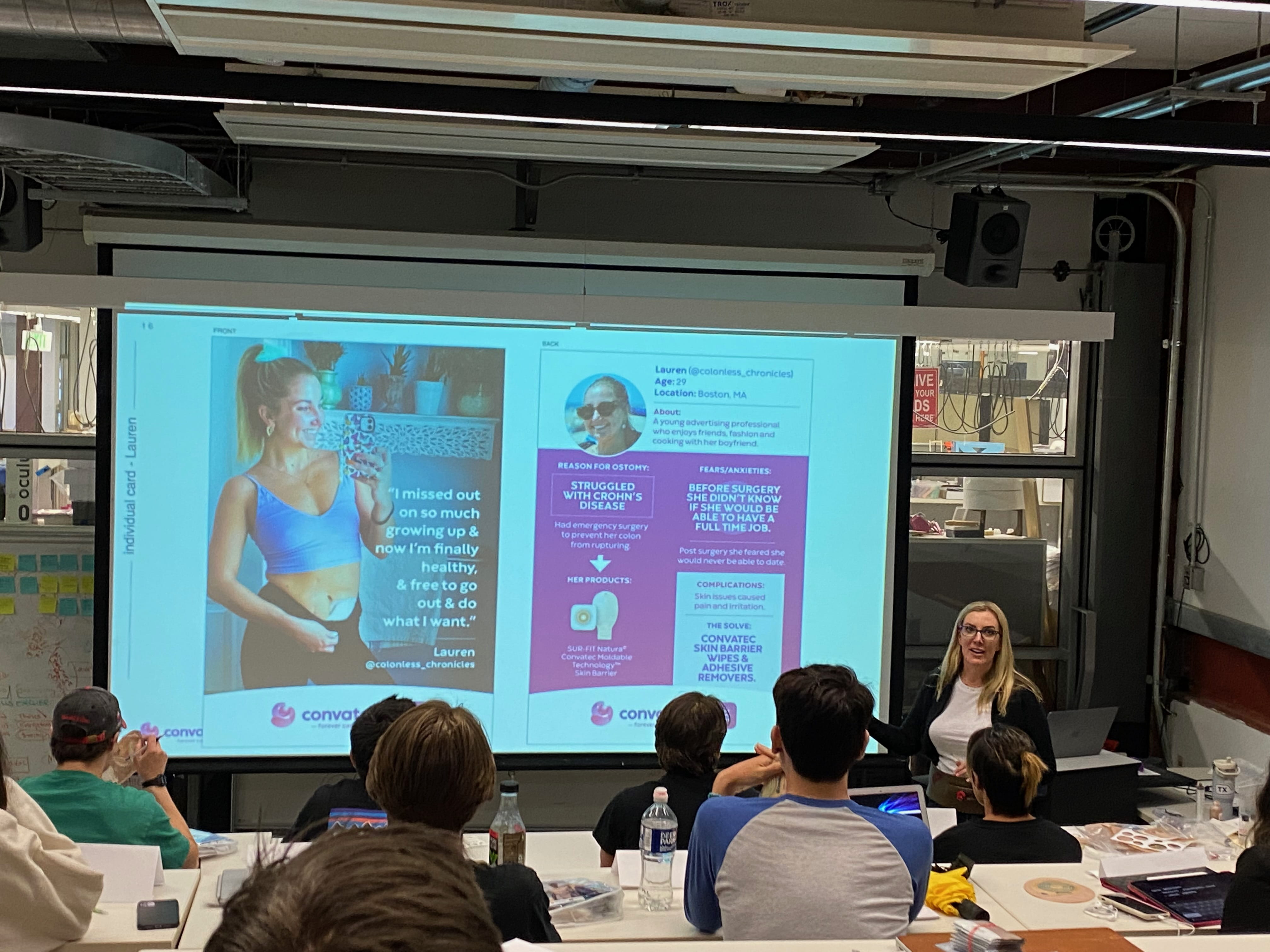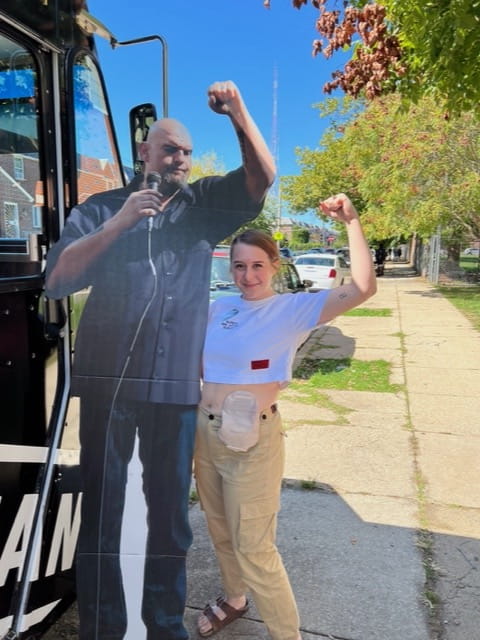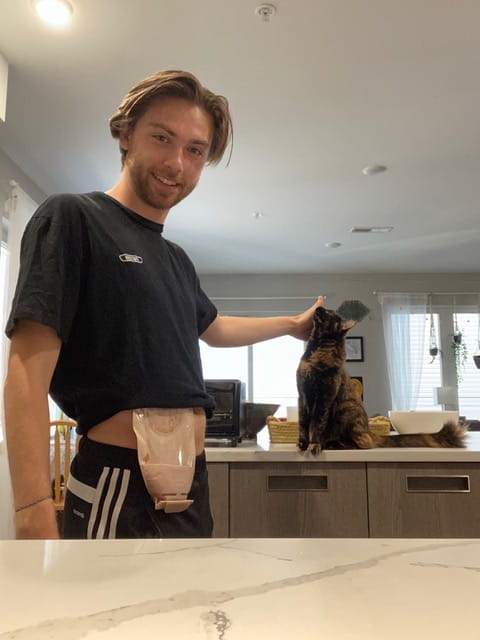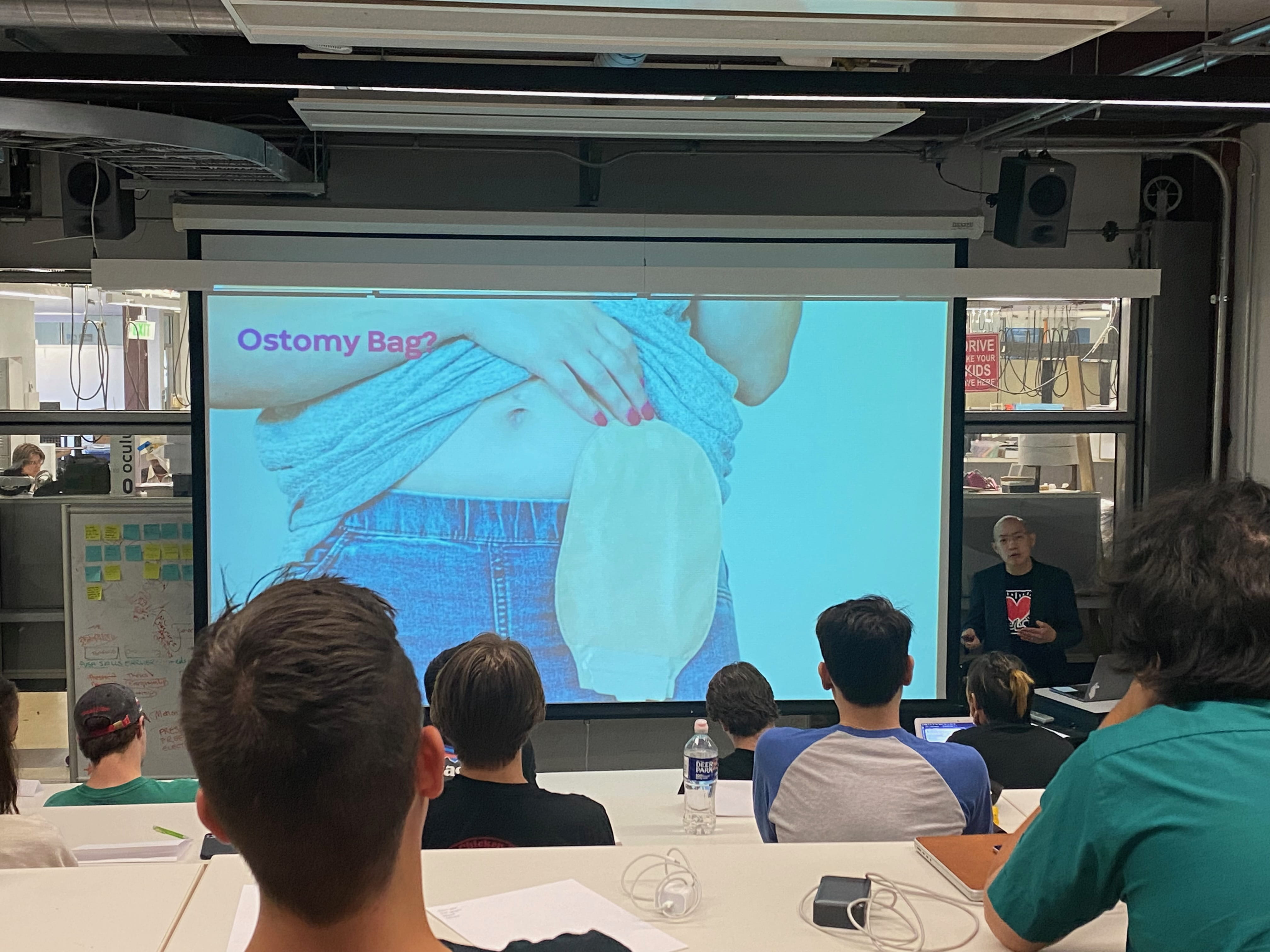Medical Device Company Challenged Design, Engineering Students During Fall Term
By Natalie Kostelni

It was the last day of Associate Professor Mike Glaser’s Interdisciplinary Product Studio (PROD 340) class and students were making presentations before five executives from Convatec Group, a British multinational medical device maker.
The students —from a range of disciplines — biomedical engineers along with product and fashion designers — were provided with a challenge from Convatec at the beginning of the 10-week course at the Antoinette Westphal College of Media Arts & Design that culminated into this moment.

The company asked the students to design a more attractive ostomy pouching system, commonly referred to as an ostomy bag, without compromising its medical function. It also tasked them to find ways to lessen the stigma associated with wearing the medical device and improve the perception of it. While the prosthetic is mostly associated with aging seniors, their use is skewing younger.
Nirali Shah, a junior majoring in product design, was presenting with Claire Wessles, a first-year graduate student, on various stoma products that can be used during intimate moments. As the students addressed this intersection of two sensitive subjects, Convatec executives were taking notes and later praised the team and other students for their thoughtful work.
“This was the first time I took a class like this, and it was one of the best classes I’ve taken,” Shah said a few days after her presentation. “We thought it was great to work with a medical device company. It gave us experience we need as designers and taught us how we can help people as well.”
Courses driven by industry challenges aren’t new to Drexel University, but expanding these opportunities is an important focus of Drexel’s 2030 Strategic Plan and the Drexel Solutions Institute, which connects industry to the University.
When students take an industry-sponsored course, they delve into real-world problems, build analytical skills to look at issues comprehensively, and have the freedom to take risks and experiment. During these courses, students work alongside industry leaders, who provide feedback and offer them a glimpse of what work will look like after graduation.
“A course like this offers students an interdisciplinary approach to their learning, and it tied into my experience as a custom design major,” said Alexandra Pachkowski, a fifth-year student in the Pennoni Honors College who is focused on sustainable human design with a minor in product design.
“My major has three nodes — materials engineering, sustainability and architectural design —so I tend to look at things in an interdisciplinary way and try to find connections and overlaps among different courses,” she said. “This course struck home for me, and I identified more strengths and weaknesses in myself by experiencing it.”

Aside from finding connections among the various subjects Pachkowski is studying, she noted that the collaboration with her small group on the project proved energizing as each brought their respective strengths to the problem. That they were working on real-world issues, presenting to a client and getting feedback from company executives along the way also motivated the team, she said.
“This project being done in an academic setting was valuable at the core,” Pachkowski said.
A first-year graduate student earning a master’s in fashion design, Wessles had never taken a course directly involving a large, multinational company and was hesitant to do so because it focused on product design. To her surprise, the experience proved to be rewarding.
“It was fantastic,” she said. “I loved getting to work with the product students and learning how they do everything. In fashion, we’re more rigid and don’t always get the freedom to create.”
Wessles was also impressed with the feedback from company executives throughout the term and pleased she has an addition to her portfolio of work. In fact, the course proved so compelling, Wessles is now considering a minor in product design.
While the realm of product design was new for some students such as Wessles, for others, like Evan Charlesworth, it confirmed a desired career path. Charlesworth, who is on track to receive his undergraduate degree this spring in biomedical engineering, wants to land a job with a medical device company.
“I thought it was great,” he said. “As somebody who would not have had any industry experience other than a co-op, it was helpful to work with a company and look at their products. It’s important to break out of the scholastic realm of things and see what goes on in the real world. We tend to get lost in math and science but there’s a whole lot more to engineering.”
Though he lacked design experience, Charlesworth found support from the other students in his group who are focused on fashion and design. When he was struggling with a problem at one point, a design student suggested he make a mood board, something he had never done before. “Doing that helped a lot,” he said.

“Overall, I think it was fantastic, and I think the students delivered and exceeded Convatec’s expectations,” said Glaser. “I was very proud of the students embracing this project and giving it their all.”
While Glaser embraces the positive impacts of industry-driven courses, he’s said they also come with challenges, including managing students’ expectations, helping them to understand the magnitude of the project and of working with a large company who is essentially a client, and connecting the needs of the people with the needs the product serves. There is also a balancing act between serving as an educator and project manager on industry-driven courses, he said.
While companies or organizations involved in these types of courses frequently have an expectation students will produce something usable, that wasn’t necessarily the case with Convatec.
While Hung-Hsaing Chen, head designer at Convatec, wasn’t expecting students to create the next big thing for the company, one of his primary motives to participate was to bring more design awareness and innovation to the health care industry.
“For most students, this is not a category they have thought of, and the health care industry doesn’t know how to use designers,” he said. “Designers can be a superpower for a business. We are not here just to design something for its aesthetic but to solve a life problem for someone. Inherently, that is much more important.”
And, for Chen, that begins by educating students one class at a time. He plans to explore more such opportunities at Drexel. “Our work,” he said, “has just started.”
The Drexel Solutions Institute is a gateway for industry leaders to connect with research-active faculty and our University community. To learn how to get involved, faculty, students and prospective industry partners are encouraged to visit the Drexel Solutions Institute online and contact DSI@drexel.edu.